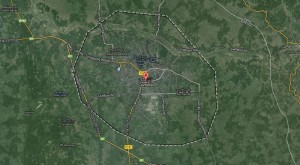
In an announcement on state television, chief election commissioner Kazi Rakibuddin Ahmad said the polls would take place on Jan. 5 and urged all parties to take part in the contest for the 300-seat parliament, defying the threat of a boycott by the 18-party opposition alliance.
Ahmad said that the army would be deployed across the volatile nation to prevent clashes between political rivals.
But the opposition immediately demanded a suspension of the voting date and called a nationwide protest to block roads, railways and waterways from Tuesday morning.
Supporters of the BNP and its Islamist allies hit the roads in cities and towns across Bangladesh on Monday night to protest.
They set off dozens of small bombs, clashed with the authorities and blocked roads and railways, trapping thousands of passengers, police officials and local media said.
One BNP protester died in the eastern city of Comilla after a bomb thrown by a fellow protester hit his head and exploded, local police chief Tutul Chakrabarty told AFP.
“He was rushed to hospital in critical condition and died after about three hours,” Chakrabarty said, adding the protesters also torched a car and set off at least eight small bombs.
The 18-party alliance led by former premier and BNP chief Khaleda Zia has been demanding that Prime Minister Sheikh Hasina quit immediately and make way for a caretaker government to oversee the election.
BNP spokesman Fakhrul Islam Alamgir called the planned election a farce, saying the polls would not be free and fair with Hasina still in power.
“We reject the election schedule. We ask the election commission to suspend the date until a political consensus on election-time government is reached,” he told reporters.
“We won’t take part in any farce in the name of elections,” he said, after the date was announced.
Hasina has rejected calls for a caretaker government, and instead formed a multi-party interim cabinet last week which is largely composed of her allies.
She asked the BNP to join the cabinet but her invitation was bluntly refused by the opposition.
While previous elections have been organized by non-party caretaker governments, Hasina scrapped the arrangement in 2011.
She argued that the system had paved the way for the army to seize power in a country which has witnessed at least 19 coups since 1975.
In his address, Ahmad said he had asked President Abdul Hamid—whose post is largely ceremonial—to negotiate an end to the dispute between Hasina’s Awami League and the opposition which is dominated by Zia’s BNP.
“We’ve asked the president to personally initiate special steps and end this unbearable impasse,” Ahmad said.
“I’ve asked all political parties to uphold the will of the people, maintain peace and compromise.”
Weeks of protests
The announcement of an election date came after weeks of deadly protests by the BNP and its allies left at least 30 people dead and hundreds injured.
Security has been tightened with the deployment of paramilitary border guards in major cities, private Somoy television said.
A police spokesman told AFP that a senior BNP leader was arrested on Monday night.
This year Bangladesh has been reeling from the worst political violence since its independence after a controversial war crimes court handed down death sentences to the leaders of Jamaat-e-Islami, the largest Islamic party which is banned from fielding candidates on Jan. 5.
At least 150 people have died in the clashes, pitting tens of thousands of Jamaat supporters against police, paramilitaries and ruling party activists.
US Ambassador Dan Mozena met Bangladesh’s new Foreign Minister Mahmood Ali Monday, stressing the importance of talks between the two major parties.
“The process of the election schedule makes the dialogue more urgent between the two political camps,” he said, adding the talks were crucial for free, fair and credible elections.
Bangladesh has been plagued by political violence ever since it won independence from Pakistan in 1971 after a bloody war of secession.
Deadly clashes and a boycott threat by the Awami League led to the cancellation of elections in January 2007 and a subsequent coup.
An army-backed civilian government remained in power for two years until it called elections in December 2008 which were overwhelmingly won by the Awami League.—Shafiqul Alam